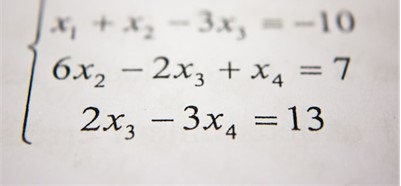Arlinda Wiebe works as a professional mathematics tutor. In the following article, Arlinda Wiebe discusses how math tutors must possess a diverse set of skills and qualifications to inspire and empower students to achieve success.
With an average salary of $54,586 per year, the idea of becoming a math tutor is considered prosperous by many. However, the job brings more than a paycheck - from boosting an individual's confidence to increasing students' grades to enhancing life's satisfaction, students and the tutors themselves benefit in more ways than one.
However, math is a subject that has the power to unlock the mysteries of the universe, but it can also be a daunting challenge for students of any age. Arlinda Wiebe explains that the subject isn't a walk in the park, especially when first starting out. Parents and students alike want to ensure their tutor has the necessary qualifications, knowledge, and experience to ensure success in the subject.
What's Needed
Arlinda Wiebe says that while specific duties vary, tutors generally aid students' academic development. Whether working remotely or in person, the overall goals remain the same.
Math tutors must:
- Help students with their homework
- Prepare students for test success
- Teach pupils how to perform advanced mathematical calculations
- Improve study habits and in-classroom skills
- Educate students on mathematical processes, concepts, and computations
- Be able to work through challenges, such as students with a ODD diagnosis
Naturally, Arlinda Wiebe explains that the skills above require a certain level of discipline and understanding to increase the chances of student success. Thus, most wannabe math tutors should obtain these qualifications and boast the skills below.
High School Education and Optional College Degree
Earning a high-school diploma is the minimum requirement to become employed as a tutor. However, some students can also gain experience as peer-to-peer tutors. Individuals looking to get into the field can start this rewarding career without any further education, but many pursue degrees to increase their chances of employment.
Arlinda Wiebe says that obtaining an advanced degree in a mathematical field or the field of education boosts the likelihood of finding clients. And considering the industry's competitiveness, those who further their education are more likely to be sought out.
Tutoring Association
Joining a national tutoring association produces various benefits. But perhaps the most important are the supportive resources and career advice.
Arlinda Wiebe reports that becoming an association member allows soon-to-be math tutors to take on mentorship opportunities, attend conferences and networking events, and even obtain various certifications.
Certifications
Depending on the working environment preferred, a tutoring certification may be unnecessary. However, such courses offer advanced instruction in specific techniques and strategies while also improving credibility.
These certifications usually require background checks and two recommendation letters which are often obtained from college or university professors.
Arlinda Wiebe says that to ensure the certifications are valid, hopeful math tutors should look to secure them from one of the four primary certifying institutions:
" American Tutoring Association
" Association for the Tutoring Profession
" The National Tutoring Association
" The College Reading and Learning Association
 License
License
Math tutors who wish to work in school settings may need to obtain a license. If so, they must pursue their tutoring license before applying for jobs.
With that said, Arlinda Wiebe says that private tutors do not need to obtain a license, making this area of work a lot more attractive for the majority.
Specific Skills
Aside from the formal qualifications and certifications, mathematics instructors must display a solid skill set to succeed. These include the following:
- Strong arithmetical knowledge, including advanced mathematic knowledge
- Unbridled patience
- Positivity
- Creativity
- Active listening skills
Established Math Tutors Speak on the Benefits
After ensuring they hold the relevant skills and have obtained the necessary qualifications/certifications, industry participants state a whole world of benefits open, including:
Providing Confidence In More Ways Than One
Arlinda Wiebe says that one-to-one tutoring allows the professional to give students math-specific confidence in readiness for their exams. But mathematics isn't the be-all and end-all.
In fact, tutors are famed for instilling critical life and social skills in students and bridging the often-existing gap between educators and pupils. Being a math tutor means being a life mentor for many children or teenagers who may not otherwise receive such high-quality teachings.
Delivering Directed Learning for Increased Grades
Classroom teachers never aim to overlook students. However, the large-group nature of these settings makes that an impossible feat.
Math tutors ensure their students receive directed, customized learning that suits their abilities, growth, and circumstances. Directed guidance is key for individual success, and math tutors can provide that.
Increasing Life Satisfaction
Ultimately, Arlinda Wiebe reports that the above advantages mean these professionals play a significant role in their student's lives, which doesn't only benefit the pupil.
Established math tutors mention instilling values and knowledge in their students increases the satisfaction they obtain from their own lives. It's a win-win career choice for many.
 License
License